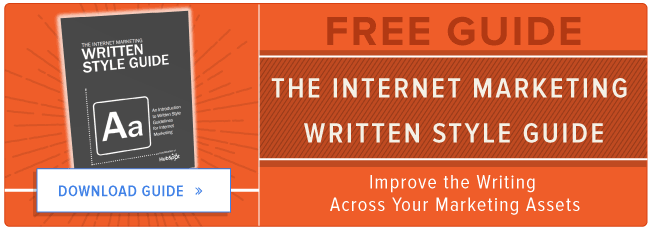 Today is my first day as a marketing fellow at HubSpot. In my last job, I was the editor in chief of a technology news site calledReadWrite。在那之前,我是技术编辑Newsweek,在此之前,我是一名技术专栏作家福布斯。我在整个职业生涯中都从事媒体业务,现在我已经保释了。
Today is my first day as a marketing fellow at HubSpot. In my last job, I was the editor in chief of a technology news site calledReadWrite。在那之前,我是技术编辑Newsweek,在此之前,我是一名技术专栏作家福布斯。我在整个职业生涯中都从事媒体业务,现在我已经保释了。最后,这是一个非常简单的决定。我意识到广告正在垂死,因此,任何依赖广告支付账单的业务都是死胡同。我对作为“主流”记者所做的那种工作越来越不吸引人。
Media companies need a new way to make money -- one that doesn’t depend on advertising. But so far nobody has come up with anything. That wouldn’t be so bad, if at least they were aware of this problem. The truly scary thing to me is that publishers either aren’t aware of this, or won’t admit it.
Instead of inventing a new business model, media companies keep trying to tweak the old one. By that I mean they keep trying to invent new kinds of advertising. It’s a pointless exercise. They’re like blacksmiths who are responding to Henry Ford and his automobile by trying to create a better horseshoe.
For a long time I didn’t want to admit how serious and profound were the challenges facing the media business. I wanted to believe, as many still do, that somehow everything will work out. Like most journalists, I get a little romantic about the news business.
But the thing is, I’m also a business journalist. As a business journalist, I could see the disruption taking place. I could see that the entire foundation of the industry was crumbling. And I knew that when that happens, in any industry, it’s time to get out.
在以后的帖子中,我将撰写有关广告的更多信息,并描述如今生活在广告支持业务的噩梦中的感觉。但是现在我要救助的原因就足够了。更重要的问题可能是为什么我来Hubspot。
Why HubSpot?
It’s mostly because I’m a content guy, and HubSpot is all about content. These days other companies are figuring out the value of being publishers, but HubSpot was a pioneer in this space. There’s a lot to learn here, and I’ll do two things I love best: write and speak. In my mind I’m still working as a journalist. I’m just not working for a traditional newspaper or magazine.
At my first meeting with HubSpot, they told me about one of their customers, a company that used to spend $800,000 a year running newspaper ads but now spends $12,000 a year for a subscription to HubSpot and gets better results.
My first thought was, "So you’re the bastards who are killing my industry." My second thought was, "Hey, are you hiring?" Turns out they were, and the more we talked the more it seemed like a fit.
Another factor for me was fun. I’ve been covering technology companies for a long time, and one thing you learn is that people working at disruptive companies have way more fun than the people whose companies are being disrupted. Unfortunately, for the past decade I have been on the side that’s getting disrupted. It has become less and less fun. I’ve experienced the heartache of working in an industry that’s collapsing. I’ve seen good, smart, talented people struggling (and failing) to breathe new life into a dead business model.
I’ve also spent the past few years writing “articles” that were less and less interesting -- they were basically justSEO chum扔到互联网上,希望能吸引流量。我已经看过编辑部被推到更不自然的职位上,以适应广告客户的需求。我坐在太多的鼓舞人心的谈话中,有人从管理层那里解释说业务已经崩溃了,我们正在躺在那里,但挂在那里。我们有一个计划。隧道尽头有光。我已经阅读了来自同事的太多告别电子邮件,这些电子邮件逐渐流入其他领域。
但是在过去的一年左右的时间里,许多人开始寻找公司内部记者的工作。对“企业新闻”的新需求使记者比以往任何时候都更容易离开帖子。英特尔,IBM,GE,Oracle和其他其他人聘请了记者。一些公司有一两个博客作者;其他人正在建立成熟的新闻机构。raybetapp
The result is that these days a lot of good journalism is being committed outside the walls of traditional media companies. As my friend Kevin Maney, a longtime tech columnist at今日美国几年前,他从主流媒体中救助的人写道:“传统媒体越来越成为一个好记者工作的糟糕地方。”
My theory is that in the age of the internet, it’s what you write, not where you write it, that matters. If I can have a platform to write interesting things, if I can work for a company that’s growing and having fun, if I can depend on something other than advertising to deliver a paycheck -- if all those things are true, then I’m in a better place.
So that’s why I left the media business, and that’s why I’m at HubSpot, the coolest company in Cambridge. Let the fun begin.
Originally published Apr 18, 2013 9:00:00 AM, updated February 01 2017
Topics:
营销建议别忘了分享这篇文章!
相关文章
![Which Marketing Channels Will Brands Prioritize in 2022 [HubSpot Blog Data]](http://www.emcdepot.com/hubfs/marketing-channels-to-focus-on.jpg)


扩展要约
社交媒体内容日历模板
Get it now